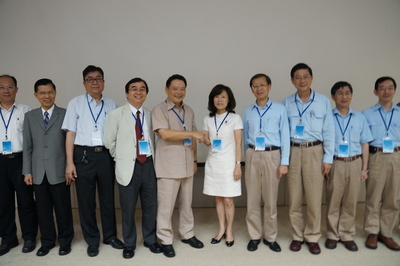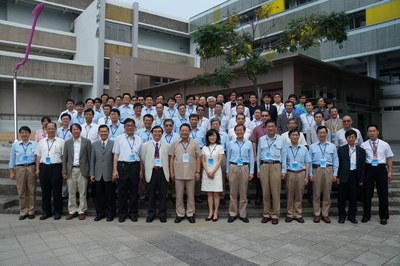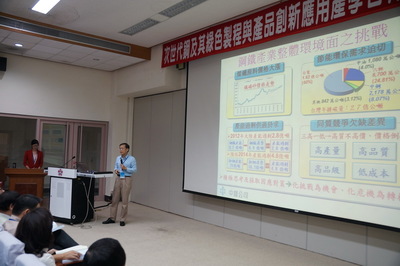NCKU and CSC activate research on next-generation steel



Tainan, Taiwan, September 13, 2013
With hundreds of millions of funding in the coming years, National Cheng Kung University (NCKU) and China Steel Corporation (CSC) are set to go all out to enhance the research and development (R&D) and production of high-grade steel in Taiwan, the university revealed at a recent meeting.
The “Next-Generation Steel and Green Manufacturing Process and Product Innovation and Application Academia-Industry Collaboration Project,” an Academia-Industry Alliance Program jointly formed by NCKU and CSC, organized a meeting, September 7, to decide on various issues related to the collaboration between both parties.
To increase both the industry’s and related industry’s output value to NTD300 billion respectively will achieve optimized benefits for the industry chain, supply chain and value chain of the steel industry, according to CSC.
The Academia-Industry Alliance Program was proposed by the National Science Council (NSC), with a view to allow the industry to provide questions and the academia to come up with solutions to these questions.
NCKU Vice President Dr. Huey-Hen Su welcomed the arrival of academic scholars and experts to the meeting on behalf of NCKU President Hwung-Hweng Hwung. Su pointed out that what distinguishes NCKU from others is her research capability to assist the industry.
“Previously, the NCKU was ranked between 30th and 50th in the world in the field of materials science and engineering-related research,” explained Su. “Research funding from the industry also occupies a higher percentage in NCKU’s total funding; in other words, a research university like NCKU possesses great strength in competition-based plans.”
CSC Chairman Juo-Chi Tsou expressed his gratitude to many of the academicians involved in this research and collaboration project. The NCKU-CSC joint academia-industry collaboration project focuses on the industry’s forward development program to be applied on advanced fuel-efficient vehicles and offshore wind turbines.
The director of this project, NCKU Department of Materials Science and Engineering (MSE) Chair Professor Dr. Weng-Sing Hwang said, “This project will be executed based on three main focuses - next-generation steel product research and development, next-generation green manufacturing process and next-generation innovative applications.”
“What is meant by ‘next-generation steel’ is steel materials with doubled product quality and doubled product life,” explained Hwang.
This large academia-industry collaboration project which will involve eight universities in Taiwan, 24 research sub-projects as well as approximately 200 people, is expected to break through the rigid traditional collaboration model, thus heading towards the direction of industry chain optimization, according to Hwang.
He said that the research concept is to use advanced product metallurgy and refining technique to produce high-quality steel materials, and integrate advanced secondary processing technique to produce high-value end products in order to achieve the best application at the same time, thus enhancing the competitiveness and the output value of the industry as well as the high-value end product application.
Apart from responding to environmental issues such as energy conservation, zero pollution and recycling as well as economic issues, this research is also expected to help strengthen cooperation among the upstream, midstream and downstream within the steel industry by developing its own supply of high grade steel materials, which in turn build the coexistence of the steel industry chain.
The “Next-Generation Steel and Green Manufacturing Process and Product Innovation and Application Academia-Industry Collaboration Project” included NCKU, National Taiwan University (NTU), National Sun Yat-Sen University (NSYSU), National Chung Hsing University (NCHU), National Chung Cheng University (CCU), National Taiwan University of Science and Technology (NTUST), National Pingtung University of Science and Technology (NPUST) and National Kaohsiung University of Applied Science (KUAS).
Integrating the efforts of the eight universities were researchers from research centers such as the Metal Industries Research and Development Centre (MIRDC) and National Center for Research on Earthquake Engineering (NCREE) which have jointly proposed 24 research sub-projects, as well as CSC who have proposed 15 special topic projects, with the aim of putting academic research outcomes into practical use in the industry.
With hundreds of millions of funding in the coming years, National Cheng Kung University (NCKU) and China Steel Corporation (CSC) are set to go all out to enhance the research and development (R&D) and production of high-grade steel in Taiwan, the university revealed at a recent meeting.
The “Next-Generation Steel and Green Manufacturing Process and Product Innovation and Application Academia-Industry Collaboration Project,” an Academia-Industry Alliance Program jointly formed by NCKU and CSC, organized a meeting, September 7, to decide on various issues related to the collaboration between both parties.
To increase both the industry’s and related industry’s output value to NTD300 billion respectively will achieve optimized benefits for the industry chain, supply chain and value chain of the steel industry, according to CSC.
The Academia-Industry Alliance Program was proposed by the National Science Council (NSC), with a view to allow the industry to provide questions and the academia to come up with solutions to these questions.
NCKU Vice President Dr. Huey-Hen Su welcomed the arrival of academic scholars and experts to the meeting on behalf of NCKU President Hwung-Hweng Hwung. Su pointed out that what distinguishes NCKU from others is her research capability to assist the industry.
“Previously, the NCKU was ranked between 30th and 50th in the world in the field of materials science and engineering-related research,” explained Su. “Research funding from the industry also occupies a higher percentage in NCKU’s total funding; in other words, a research university like NCKU possesses great strength in competition-based plans.”
CSC Chairman Juo-Chi Tsou expressed his gratitude to many of the academicians involved in this research and collaboration project. The NCKU-CSC joint academia-industry collaboration project focuses on the industry’s forward development program to be applied on advanced fuel-efficient vehicles and offshore wind turbines.
The director of this project, NCKU Department of Materials Science and Engineering (MSE) Chair Professor Dr. Weng-Sing Hwang said, “This project will be executed based on three main focuses - next-generation steel product research and development, next-generation green manufacturing process and next-generation innovative applications.”
“What is meant by ‘next-generation steel’ is steel materials with doubled product quality and doubled product life,” explained Hwang.
This large academia-industry collaboration project which will involve eight universities in Taiwan, 24 research sub-projects as well as approximately 200 people, is expected to break through the rigid traditional collaboration model, thus heading towards the direction of industry chain optimization, according to Hwang.
He said that the research concept is to use advanced product metallurgy and refining technique to produce high-quality steel materials, and integrate advanced secondary processing technique to produce high-value end products in order to achieve the best application at the same time, thus enhancing the competitiveness and the output value of the industry as well as the high-value end product application.
Apart from responding to environmental issues such as energy conservation, zero pollution and recycling as well as economic issues, this research is also expected to help strengthen cooperation among the upstream, midstream and downstream within the steel industry by developing its own supply of high grade steel materials, which in turn build the coexistence of the steel industry chain.
The “Next-Generation Steel and Green Manufacturing Process and Product Innovation and Application Academia-Industry Collaboration Project” included NCKU, National Taiwan University (NTU), National Sun Yat-Sen University (NSYSU), National Chung Hsing University (NCHU), National Chung Cheng University (CCU), National Taiwan University of Science and Technology (NTUST), National Pingtung University of Science and Technology (NPUST) and National Kaohsiung University of Applied Science (KUAS).
Integrating the efforts of the eight universities were researchers from research centers such as the Metal Industries Research and Development Centre (MIRDC) and National Center for Research on Earthquake Engineering (NCREE) which have jointly proposed 24 research sub-projects, as well as CSC who have proposed 15 special topic projects, with the aim of putting academic research outcomes into practical use in the industry.
Provider:
新聞中心
Date:
20130911